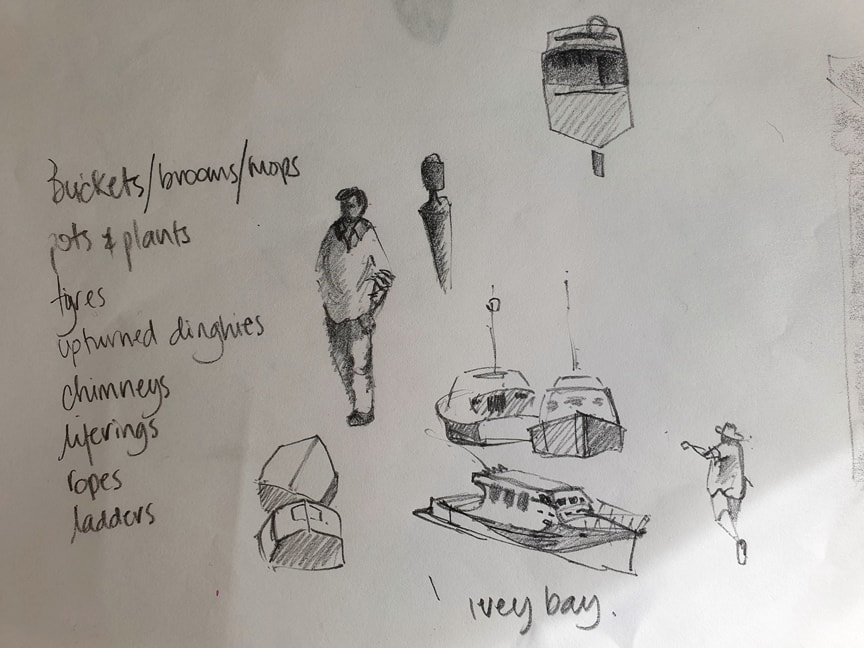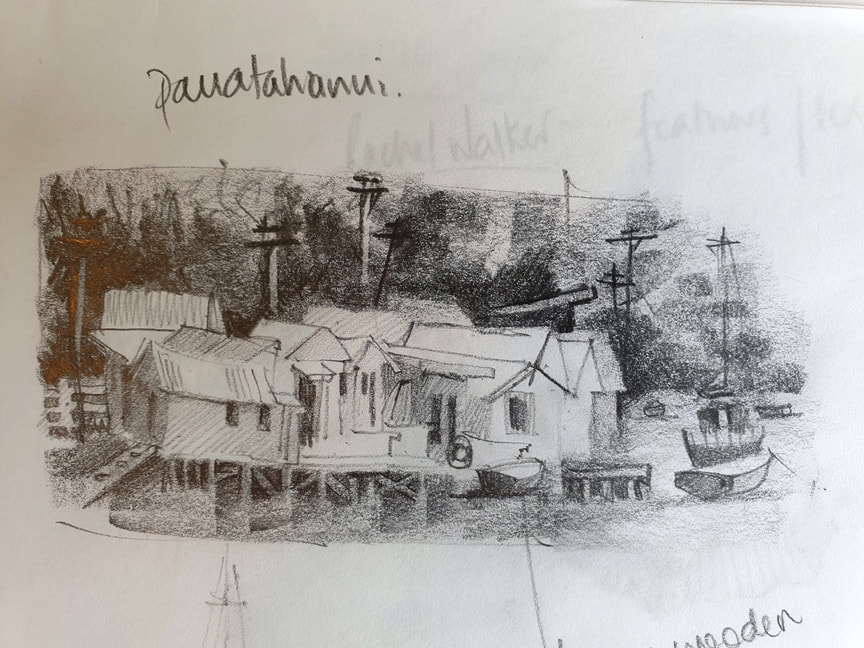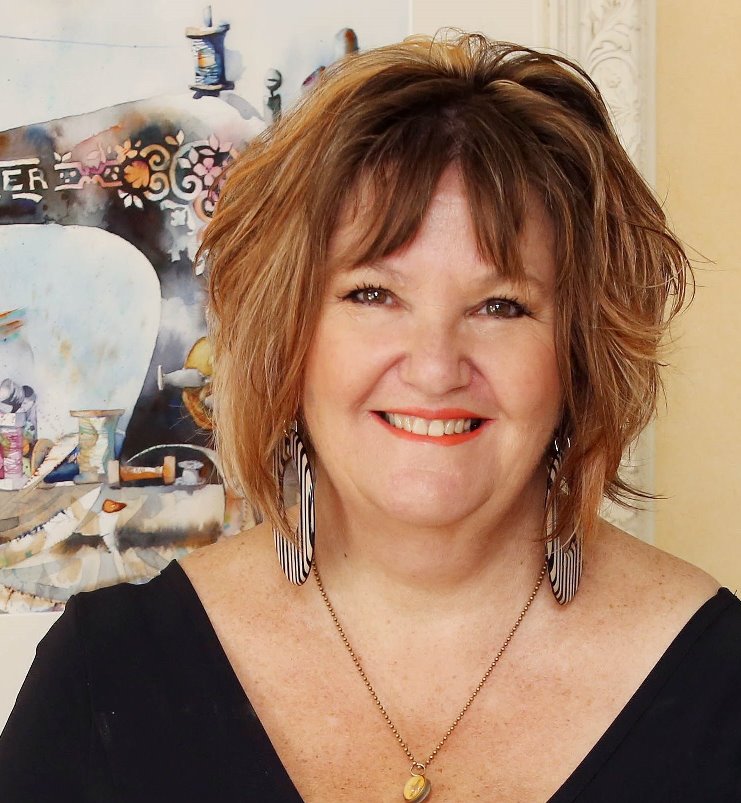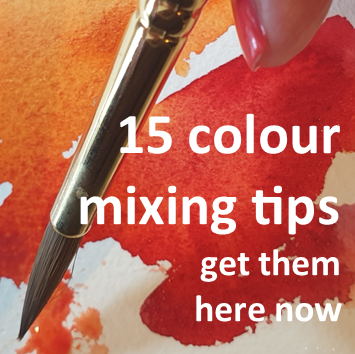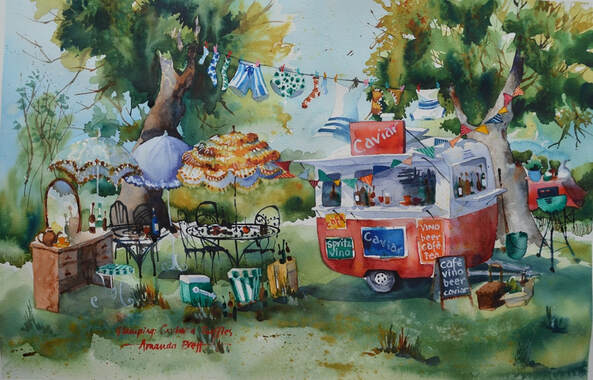 Glamping Caviar & Ruffles Glamping Caviar & Ruffles
ny artists, beginners through to professionals are concerned with developing their style, their voice.
One of my personal key concerns is to develop a unique voice - there's a tremendous amount of copying happening, not only that, when groups of people paint together regularly they all seem to paint in the same way. I don't want to paint like the hoards - I want to paint like me, i treasure the unique and the work that it requires. Many years ago, through my local art group I was fortunate to meet a highly skilled and creative artist whose style I quickly fell in love with. I attended his private tuition classes for many years and, although I don't paint exactly in this style, it is an obvious influence. My goal was to paint like me but also include an element of simplicity that is the hallmark of California watercolour. I have had to become very selective about what I see and what I study. I have a level of eidetic memory which can sometimes get in my way - I have to be careful what I look at, I have to keep my end game in my sights at all times. To that end, I don't visit galleries nor do I look at very much art online, I have a few selected books in my artist library. I have no clue who other artists are, I don't care, I'm only interested in creating unique work of my own. Further, the more time I spend away from my easel doing other stuff is too much time away from my easel. But what if you don't know what you want to achieve? How do you find what you like? How do you find something that makes your heart leap? Firstly, I recommend you only study "good" art. Go to Galleries, museums, study the masters, get recommendations from your tutor. Study everything you possibly can, every genre, every style, every artistic movement. At some point, within your practice and your research, you will find something that really speaks to you. Learn to critique, what do you like, not like. Once you find it, put everything else aside and focus all your efforts onto your discovery. A well known watercolour painter friend suggests that learning to paint is a 25 year apprenticeship, you might feel you are behind the 8-ball . However you might also find that, if you are an older artist, you have clearer ideas about colours and styles, and know the subjects you love already, its really about how to communicate those ideas in a way that pleases you - practice, practice, practice!! repeat, repeat, repeat!! what's your thinking on this? what have you discovered about yourself? ciao
0 Comments
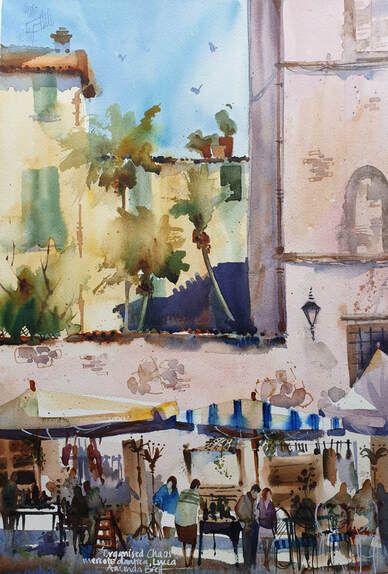 Organised Chaos, en plein air Lucca 2019 NFS Organised Chaos, en plein air Lucca 2019 NFS
FROM ORIGINAL POST 4/9/2017
The cool thing about Watercolour is that it is mostly not too difficult to fix. I know, I know, everyone says how it is the most difficult medium but truthfully, everything new is difficult and the myth sayers I've met are the ones who can't paint (watercolour) and have given up. The main issue most beginners in watercolour painting have is determining what the problem actually is!! Sometimes there actually isn't a problem but we've got to that dreadful middle stage and don't know what to do next. If you definitely have an issue to solve, read on McDuff!! If you decide the composition or design is a problem, redraw a value study of the corrected composition on spare paper and re-work the improved version into the painting. Yes - that's right paint over it, you might need more paint! Could you draw/paint it better? Practice drawing the shape you require on spare paper, then practice painting the shape/colours etc on some spare watercolour paper. Wet the offending area, sponge out problem shape/area carefully and re-draw and paint. A shape is not quite right - I've solved this problem in my paintings in 6 or 7 different ways. Here's a couple you can try (1) wedge a dark tone next to the problem area correcting the shape, (2) stencil lift to correct the shape or (3) soften an offending edge with a damp sponge. What watercolour problems cannot be fixed? The most difficult actual watercolour problem I have found is too much opaque pigment mixed too much on the palette and then stirred up too much on the paper - too dead! Sometimes a stencil-lifted highlight will work or you could try adding more detail to another part of the painting to draw attention away from the offending area or carefully glaze a transparent complementary colour over the problem area to knock it back. Always try to push yourself to finish every painting whether you've decided it will be a 'good' painting or not. The truth is, you might not be able to fix a work you've deemed irretrievable but the effort of trying will teach you more about watercolour/painting/process than starting yet another painting that you'll struggle to complete. Further, if you've already deemed the painting a failure, you really can't make it any worse - keep at it!! check out my Paintbox Tips for more watercolour help!! happy painting!! Amanda See upcoming classes HERE Student Feedback Gallery 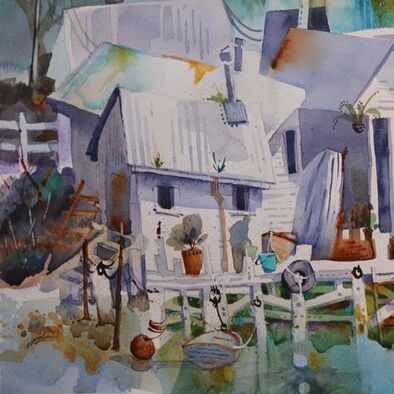
"I keep wanting to get photos of those sheds, but always seems to be wrong time of day, wrong tide or wrong weather for stopping. Or... we use the road on the other side of the estuary!"
This is what happens if you paint photo realism or you are too dependent on photos - you're probably sunk because you are waiting for ideas to happen. Ideas don't just happen - artists, scientists, engineers, poets, musicians MAKE IDEAS HAPPEN. We don't have time to wait. The ugly truth? No matter how long you wait, you will never get your perceived "perfect photo" the weather will be crap, the light will be wrong - whatever! This is really just another form of procrastination. There's 2 solutions:
when you get your horrible photos home, pick out the ones with the stuff you need and start doodling and sketching on a big sheet of paper. make lists. Sketching is an idea generator. ciao cari pittori xx
I discovered this scene on a road-trip to Wellington. For a few minutes it had great light, then it was gone. but not only that I couldn't zoom my camera in enough, I'd been driving all day and hadn't found my accommodation yet. no where to sit and soak up the ambiance so a little walk around the bay and a few quick snaps. Photos were terrible but quite a bit of information once I zoomed in.
I've seen many paintings of this scene and thought - wow, how boring - everything straight and lined up - how dull. What can i do to make this more exciting and engaging? I spent quite a lot of time doodling and playing and getting my head in the game! |
AuthorPaintBox Tips, secrets, random thoughts, Poetry in watercolour is made in the freedom of the here and now. Amanda Brett Inspiration exists, but it has to find you working - Pablo Picasso There are no mistakes in watercolour, just some extra surprises!! Categories
All
What my readers and viewers have to say
Your emails are so informative! I must confess I've watched a couple of your demos from beginning to end, and it makes me want to watercolor!!! I've only ever painted with oil or acrylics and haven't know how to begin with WC. Your content is excellent!
Susan VN Hi Amanda
Thank you for your tips. They inspired me to practise and I realised I haven’t been loading the brush properly. I learnt about adding more paint, and not water, to washes. In today’s tips I like the idea of painting with purpose. Your tips are very helpful. I very much appreciate receiving them. Elizabeth Hi Amanda I enjoyed your post and generous tips. Looked up Dan Burt I begin to see that you can colour any subject to give it pizazz so long as the tone and form is correct Certainly adding value now to my attempts Thanks heaps Annie
Yes very wise words. Agree with not fussing and agree with comments about good quality paint. Well written and inspirational as always. Cheers Janet xxxx Archives
July 2023
Copyright © 2022 All images and text on Amanda's blog and website are the the legal property of Amanda Brett and may not be reproduced without express permission from Amanda Brett or her authorised agent. Thank you for respecting her art and the livelihood of all artists.
|

